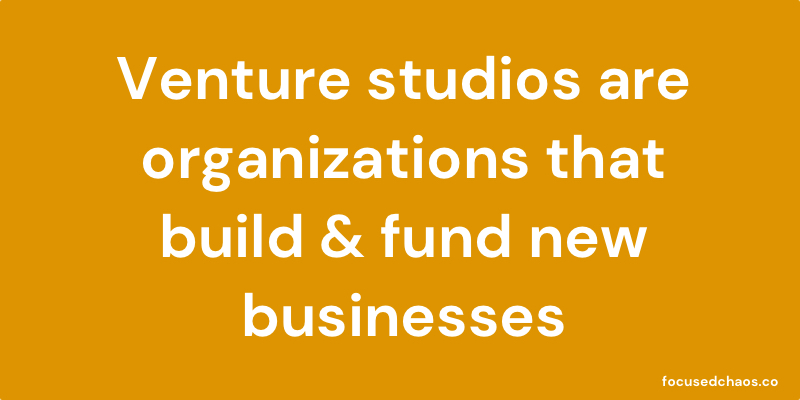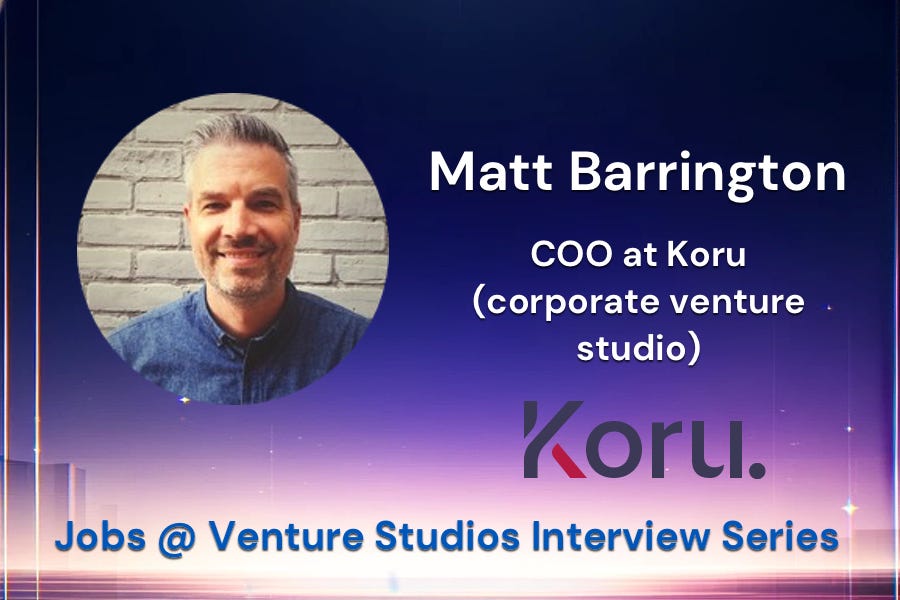The #1 Thing Venture Studios Need to Succeed
Money? People? Resources? Luck? Grit? Brains? All important, but not the most important. (#80)
Q: What’s the #1 thing venture studios need to succeed?
A: Privileged access.
It sounds elitist, but it’s not.
It’s hard to get; you have to earn it.
It makes the difference between winning and losing.
Privileged access means you (as a venture studio) have connections to something that others do not. Founders that join your venture studio gain that privileged access, shortcutting any number of complex, messy and risky steps in building new startups.
🎉 We interrupt this (hopefully) useful post…
I recently signed up for Intro, a service that allows you to book time with a variety of experts. If you’re interested, reach out! Potential topics include:
Venture studios
Fundraising / pitching
Product / product management
Analytics
Startups in general
50% of proceeds go to Ronald McDonald House (for which I have a very personal connection).
➡️ Book time with me here: https://intro.co/BenjaminYoskovitz
The “Startup Factory” Metaphor Sucks
A factory’s purpose is to produce the same thing over and over. It’s why many venture studios emphasize their “venture building methodology” because it provides operational consistency & efficiencies when building startups.
How does a venture studio validate a problem? There’s a process for that.
How does a venture studio validate a solution? There’s a process for that.
How does a venture studio take things to market? There’s a process for that.
So on, and so forth. 🥱
Startups don’t win through rigorous process alone. Lean Startup, Design Thinking and Jobs to be Done are fantastic frameworks for testing ideas quickly, finding pain points worth solving and repeatably being able to validate + build things. I’m a huge fan & believer.
But startups don’t come out of factories. Most venture studios follow a fairly similar validation methodology (some are better than others). The differentiation doesn’t lie in the process. There’s value in the process, but not enough to win without privileged access to other things.
What’s the point of a venture studio in the first place?
Venture studios are meant to repeatably build and fund startups. But what does that actually mean?
Even within a venture studio, the process is messy. Studios de-risk (or increase confidence) in opportunities through their methodology, but more is needed.
To really make a difference, venture studios need to create shortcuts.
Shortcuts are pathways through the messiness that make it easier and faster to get through things.
Shortcuts are “secret passageways” through the dungeon that most adventurers never find, leading to victory.
Have you ever played Snakes & Ladders? The ladders are shortcuts. You can win without climbing any ladders, but it’s easier if you do. Granted, Snakes & Ladders is completely luck-based (startups are not)—and venture studios need to manufacture ladders.
Investors ask founders all the time, “What’s your differentiation? What’s your competitive or unfair advantage?”
Fair questions.
Founders, you should do the same: “Investors, what’s your differentiation? What’s your legit advantage?”
Every investor proclaims, “we’re value add!” But what does that honestly mean? In most cases, not much.
For venture studios it’s THE THING. Sure, venture studios provide capital as well (if not, I don’t consider them a venture studio), but that’s not enough to justify their existence. The “value add” is key. It better be real, specific and of particular interest to the founder / startup being built.
Privileged access (which a studio has attained and is providing to founders/startups) is the key to creating valuable shortcuts.
7 Types of Privileged Access Venture Studios May Have
Here are several examples of privileged access that a founder / startup going through a venture studio can benefit from.
1. Access to customers
Every startup needs customers (or users). Getting the first handful is often a slog. Venture studios with access to customers bypass the initial customer acquisition challenge.
Having a network isn’t enough. Introductions are helpful (referrals ftw!), but venture studios should go further. Ideally they’re already engaged with the target customers, connecting regularly and understanding their pain points. That level of access with a commitment as design partners / beta testers / early adopters is super valuable.
Founders: Imagine joining a venture studio and already having your first 5 beta customers ready to go, with the problem pre-validated and commitments to try the solution you build. That’s powerful.
This is one reason vertical venture studios are so interesting. A vertical venture studio focuses on a narrow niche. Doing so eliminates variables; for example the customer types its startups go after. Imagine a venture studio only focused on 1 industry and targeting SMBs. The SMBs are well-defined and the studio is in constant communication with 50 of them. A different venture studio might focus on the same industry but target big enterprise. They’d probably have less design partners / customer relationships, but even a handful give its startups a huge leg up.
Corporate venture studios can win this game
Big companies already have a lot of customers. A corporate venture studio, built within or next to a big company, needs access to them. Figure that out and corporate studios have a huge advantage over everyone else.
It’s not easy for a big company to give startups (even startups it’s incubating) access to its customer base. But the benefit is obvious.
2. Access to capital
Venture studios usually can’t fund things entirely on their own, at least not past the initial incubation phase.
Raising capital is hard. For most founders this is one of the messiest and most painful experiences of building a company. It also takes them away from growing their business. I’ve heard countless times, “I know this process takes 3 to 6 months at least, and it’s all consuming, but how do I do that and grow my startup at the same time?” How, indeed. 😭
The answer: It’s freaking hard and you have no choice.
Unless…the venture studio you’re working with has deep relationships with co-investors. Every investor has a network; venture studios need to take it a step further. They need pre-vetted co-investors that are excited about the venture studio model. Those co-investors have to appreciate that a venture studio deal may look different from a “traditional VC deal.” They have to appreciate the value of the venture studio (not look at it as neutral value or worse, negative value). Those co-investors have to be excited about the industry/vertical (again, another reason to build a vertical venture studio).
Venture studios can’t guarantee automatic co-investment. Founders still have to pitch and work for it. But a strong, active co-investor network reduces the complexity and “desert wandering” that many founders go through when fundraising.
3. Access to acquirers
You can’t telegraph an exit from day one. But waiting 10-15+ years for liquidity isn’t awesome either, especially for venture studios. They need to show early wins. Those early wins are meaningful since venture studios often own 20-40%+ of each startup they build. It’s why some venture studios aren’t even looking to build venture-scalable companies—they’d prefer to build for quicker exits, which done frequently enough is a significant way to generate value.
Venture studios that “graduate” startups into the big, bad world leaving it up to founders and future investors to figure things out take on on a lot of risk. It’s similar to what angel investors do; they invest super early but have minimal influence on the long term trajectory of the startups.
Instead, venture studios should be constantly building relationships with acquirers. This is tough to do unless you’re running a vertical studio (you can’t build relationships with every type of acquirer out there). Relationships with acquirers provides intel into what they care about, what they’re looking at, white space they see in the market, etc. All of this is valuable for figuring out what to build and how to position new startups for acquisition (early or otherwise).
4. Access to networks
Customers, co-investors and acquirers are critical, but startups also benefit from a variety of partners. For example, many startups scale distribution through partnerships. There are partnership opportunities with social media companies (i.e. Snapchat, Tik Tok, IG, FB, etc.) and infrastructure players (i.e. Azure, AWS, etc.)
Many SaaS vendors will offer discounts and perks through accelerators, incubators, VCs and venture studios. These aren’t huge difference makers, but saving money early on is a real bonus.
Talent networks are important. Founders have to spend a ton of time recruiting. Having a talent network in place, access to contractors, etc. is a time saver, and therefore a shortcut.
Winning is often a question of who you know—and venture studios should be super well connected in order to give founders and startups leverage.
5. Access to technology
Hyper-focused, vertical venture studios may have technology that’s reusable for each startup. This speeds up development time (great shortcut) and gives startups a chance to secure traction faster (always a good shortcut).
Many venture studios, in an attempt to optimize the validation process, will have standardized tools, technology and capabilities for landing page building, no-code rapid prototyping, value proposition testing through ads, etc. Generative AI plays an increasingly important role. These are valuable ways to speed up test & learn cycles, which is a legitimate advantage over a startup that has to do everything from scratch.
Corporate venture studios may have existing technology or tech capabilities that are valuable for building companies. I’ve seen this with under-utilized assets that a corporate venture studio decides to leverage for a new purpose.
6. Access to data
Vertical venture studios and corporate venture studios are best positioned to have useful data to consistently new companies.
Vertical venture studios should have a ton of research & insights (including quantitative data) that’s usable; they may also have user/customer data or other data that can spawn new businesses.
Corporate venture studios may be able to tap into their parent company’s data, which is plentiful. Big companies have more data than little companies. Accessing it isn’t easy, but if done well, it’s a huge advantage.
7. Access to expertise
Even superhero founders need a ton of help. Hero worship at your own risk.
For a startup to win it needs so many skill sets and capabilities. It needs so many things to go right. Founders will—out of sheer perseverance and grit—navigate (read: bumble) their way through everything that needs to get done, but a studio can shortcut things with experts.
Imagine a venture studio with access to:
Growth marketing experts, alongside content creators that can take care of your social + content strategy, or help you generate giant lead lists and automate outbound.
Legal, regulatory and compliance experts (on staff or as contractors) that can help you navigate issues.
Product expertise to help figure out the right MVP to build and coordinate the various people doing the work (i.e. design, dev, etc.)
A rolodex of domain experts you can tap into whenever need be.
The list goes on and on. A well-connected studio provides founders with privileged access to experts and expertise “on demand.” That’s a huge shortcut versus having to chase these people independently.
Q: How can corporate venture studios provide privileged access?
If you’re focused on corporate venture studios, this is a good section to read. If not, please skip ahead.
Corporate venture studios are building ventures in partnership with a big company. Those ventures may be independent businesses that spin-out, or subsidiaries/wholly owned entities (i.e. spin-ins). In the context of privileged access and the value derived from the corporate studio, it doesn’t matter how you do things structurally.
Big companies have assets:
Customers
Domain experts
Data
Technology
Brand
Capital
Etc.
The magic happens when a big company builds new companies that are able to leverage those assets. It’s difficult to pull off, but not impossible.
I recently spoke with COO and Partner at Koru, Matt Barrington (a venture studio funded by Ontario Teachers’ Pension Plan / OTPP), who had this to say:
“The unfair advantages come from unlocking assets from OTPP and its portfolio companies and comes in all different shapes and sizes, but ultimately we need to build conviction that we can, first, unlock them (which is not a given) and by doing so that they will allow us to win both now and persistently into the future.”
In my experience, this is a “systems design issue” which means that a lot of focus and effort needs to go into designing the corporate venture studio and its relationship with the parent company.
Matt highlighted how challenging this can be:
One of the most important lessons I’ve learned for any corporate venture studio, and this comes again from both success and failure, is that unlocking unfair advantages is a hard problem to solve in a repeatable and scalable way. This problem involves people, culture, inertia, incentives and all of the messiness that comes with that. Aligning incentives sounds simple in theory but is incredibly difficult to do in practice.
In another interview, I spoke with Becky Splitt, previously from Tenney 110, which was American Family Insurance’s venture studio. Tenney 110 shut down in late 2023 after launching several successful businesses.
A corporate studio must be certain they bring an unfair advantage to the table. They have assets in the form of data, talent, capital, brand, technology, channels, and of course access to customers. These things can be nearly impossible for a startup from the outside to access. Indeed a wholly owned venture studio still has to jump through many hoops to unlock their potential. So whatever the unfair advantage is for a particular venture, that must outweigh the tax that comes with building a startup within a large corporation.
Corporate studios also, by and large, have a willingness to spend more funding and time up front to do the market and customer testing before writing a line of code. Provided this doesn't dull an important sense of urgency or turn into bloat, that should lead to a better batting average over time.
Even at Tenney 110, where the studio was arm’s length from the mothership (a separate legal entity, intentionally prohibited from operating within the regulated insurance space, with capital to deploy), AmFam executives, who made up Tenney 110’s board, required that things like IT, security and hiring practices conformed with those of the corporation. Again, to compete with well-funded startups you must believe you can both leverage the corporation's assets and overcome the inertia of a large corporation with respect to each venture.
Building a corporate venture studio requires a ton of thought across a few big areas:
Operational Structure
Operational Model & Methodology
Governance
Team / Talent / Incentives
Financial Impact
Partnerships
I know it’s possible to unlock competitive (and potentially unfair) advantages from corporates within a corporate venture studio, but it’s definitely a challenge.
Venture studios need privileged access to something
Venture studios need to ask themselves two questions:
What privileged access do we have and how is that consistently valuable for building new ventures?
What privileged access do we need to get and how quickly do we need it?
Founders interested in venture studios need to ask:
What privileged access does the venture studio have and how will that help me shortcut the process to winning?
The answers better be clear. I expect a lot of venture studios will struggle with this and as a result create mediocre companies that aren’t actually accelerated through the initial messy, confusing & complicated phases of startup building. The shortcuts won’t be there, and these startups will be no better than they would have been on their own.
Helpful venture studio resources
Are you building a venture studio? Here are two valuable resources to help:
The Venture Studio Checklist: 60+ questions/variables you need to understand when designing your venture studio.
The Corporate Venture Studio Checklist: Similar to the checklist above, with additional questions/variables specific to corporate studios.
Are you thinking of joining a venture studio as a founder, Founder in Residence or Entrepreneur in Residence? Here’s a resource to help:
The Founder Worksheet for Selecting a Venture Studio: 50+ questions/variables to help founders assess the right venture studio fit.










Knowing how to use these privileges is where/when the magic happens.
Excelent text!